Gangs of London
Season 3
Episode 2
Fool me once, shame on you…
Oh, wow.
LOL.
Even – dare I say it? – LMAO.
Fair play: I absolutely did not expect S3 E2 to end the way that it did. I don’t know what I did expect, but it certainly wasn’t this.
Fair play: I absolutely did not expect S3 E2 to end the way that it did. I don’t know what I did expect, but it certainly wasn’t this.
The best episodes of Gangs of London tend to be the ones that are the most self-contained. The show is most comfortable with itself in the short- and medium-term aspects of its storytelling, whether in the keyed-up pageantry of its ultraviolence, or in the jolts provided by its soap-operatic character deaths; betrayals; revelations; reversals of fortune. The episodes that most emphasise the present-tense, and keep the narrative filigree in the background – I’m thinking, for example, of S1 E5, or S2 E7 – are the ones that tend to be the most impactful.
For roughly its first 43 minutes, S3 E2 is an excellent example of that kind of episode. As for its last three minutes… well, we’ll get there.
The episode starts with a fabulously tense, dialogue-free sequence that sees Sean being transported to his court hearing. He sits inside an armoured van, wrists and ankles shackled, attended to by two flak-jacketed prison guards. His eyes alight on the watch on one of his jailer’s wrists; he smirks, and surreptitiously braces himself against the steel bench.
An explosion knocks the van onto its side, and a quick, brutal fight follows (clearly taking notes from the prisoner-transport escape scene in The Night Comes for Us). Sean wrestles away a gun from his captors and shoots them both dead, just in time to see the van’s door forced open. Billy and Cornelius welcome him, grinning, into the landscape of scorched concrete and burning bodies left behind by the bomb that broke him loose.
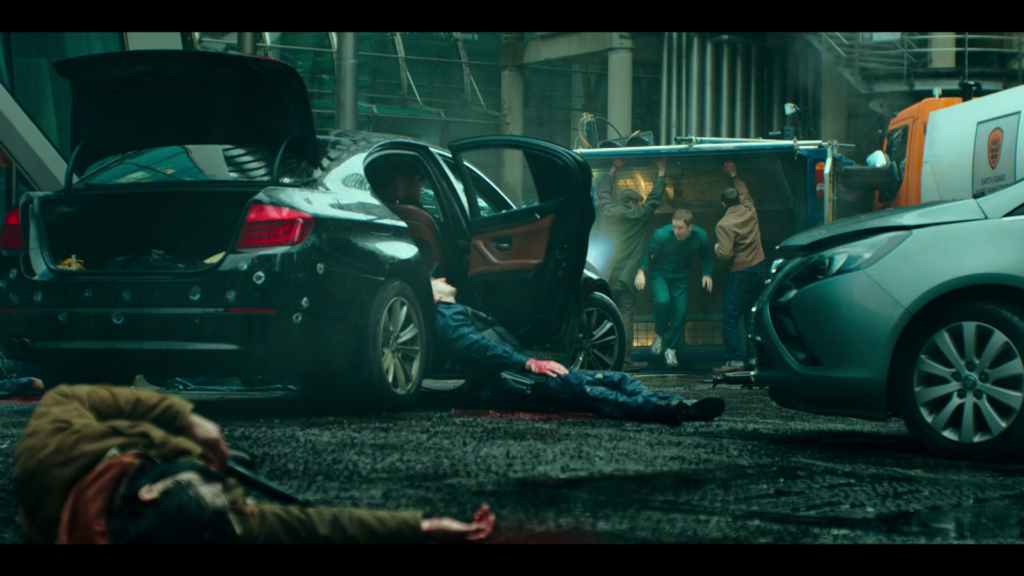
Sean, Billy, and Cornelius have grand ambitions for their side of the family; they just have to get to a helicopter in Greenwich, which will spirit them away to Ireland. There, they can consolidate their resources and influence, before coming back to storm London and put Sean back where he belongs, at the top of London’s criminal pecking order.
That’s the plan, anyway, for about forty-five seconds of screentime, before their retrieval operation is itself ambushed. Their car crashes, and a gun battle erupts on the streets of central London in broad daylight. Luan is in full-blown rampage mode, and blames Sean personally for Elira’s death by overdose. During the gunfight, Sean is separated from his brother and his uncle. Alone and unarmed, still wearing a prison jumpsuit, he flees on foot into London’s sprawl, pursued by furious Albanian gunmen.
S3 E2 plays out as a single, elaborate, extended set-piece, following Sean’s quest for safe harbour, hounded on all sides by all his many enemies. It recalls genre touchstones like Walter Hill’s The Warriors or Yann Demange’s ’71; stories of men trapped behind enemy lines and having to survive by their grit and their guile, while political power-plays swirl above their heads. Luan is hunting Sean, to extract retribution for his daughter (Sean insists, at various points, that he was framed for the fentanyl poisoning and he had nothing to do with it, but it dissuades no-one). The impoverished youth of London are hunting Sean, for the £2 million bounty Luan has placed on his head. And Elliot is hunting Sean, for the answer to who killed his family.
S3 E2 plays out as a single, elaborate, extended set-piece, following Sean’s quest for safe harbour, hounded on all sides by all his many enemies.
The episode’s momentum is relentless, its intensity gruelling. Kim Hong-Sun again directs, and I know I criticised his direction on S3 E1 for being kind of slack, but I’m happy to reverse that criticism here. Perhaps the script’s cat-and-mouse structure activated something in him that the previous episode didn’t; or, perhaps creatives just have their on-days and their off-days. I wasn’t on set: who’s to say? For whatever reason, the visual language here is so much more engaged and exciting and subjective, making dynamic use of close-ups and low angles and handheld tracking shots throughout. With each scene, the walls close in on Sean incrementally more tightly.
At one point, he tries to turn to Lale for safe harbour. He shows up in his ex’s office, wearing a ratty hoodie, his face bruised, holding a gun on her. He says he regrets the way they parted, and politely asks for cash and the use of her car. This, as you can probably imagine, goes over catastrophically badly.
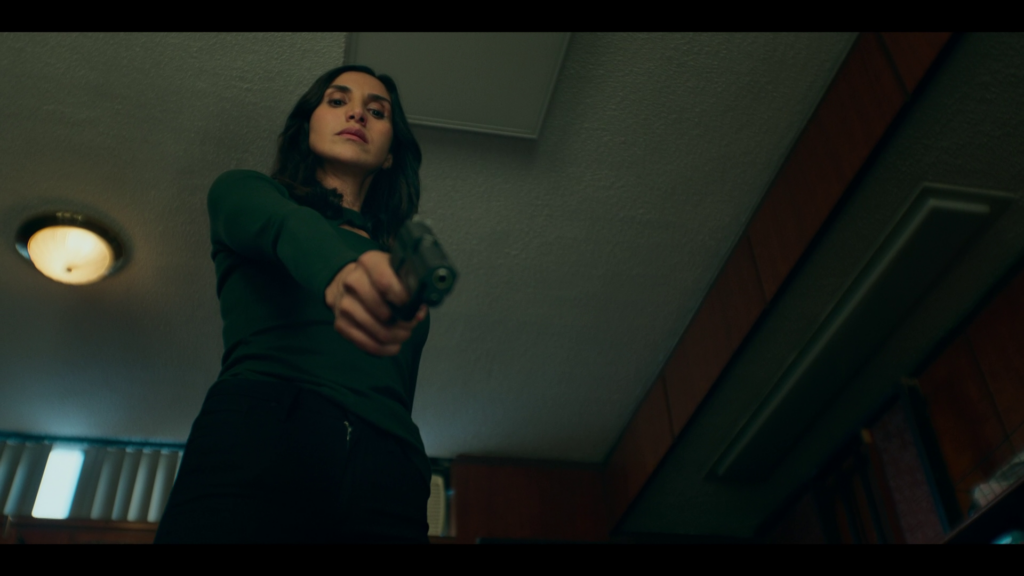
At this point in Season 3, Lale has a question mark hanging over her. No-one’s quite sure how she got away from Asif, or what she was up to for the past seven months. Her aide-de-camp Merwan (Murat Erkek) is getting suspicious when she evades his questions. What’s not ambiguous is how she feels toward Sean after what he did to her in S2 E6. She pretends to retrieve cash from a safe, only to grab a concealed pistol instead, and shoot her treacherous boy-toy in the gut.
Sean survives, and manages to limp away while Lale calls for backup. By happenstance, he stumbles into The Horseshoe (a real-life pub in Clerkenwell, and itself a charming callback; it’s the same pub that Elliot fought his way through in S1 E1. There’s even a blink-and-you’ll-miss-it cameo from David Bradley, still rooted at the same fruit machine where was sitting five years ago.)
[The Devereuxs’] Cockney-flavoured bickering gives the episode a welcome beat of light comic relief.
He passes out from blood loss, but wakes up to find himself being nursed back to health by the pub’s proprietors, Deborah and Ronnie Devereux (Ruth Sheen and Phil Daniels, respectively), a cheerfully grumpy married couple who owe a decades-old debt of gratitude to Finn Wallace. Their Cockney-flavoured bickering gives the episode a welcome beat of light comic relief. Ronnie, after some nagging from his wife, agrees to guide Sean through the sewer access tunnels to Greenwich, where the waiting helicopter pilot is growing increasingly anxious to take off.
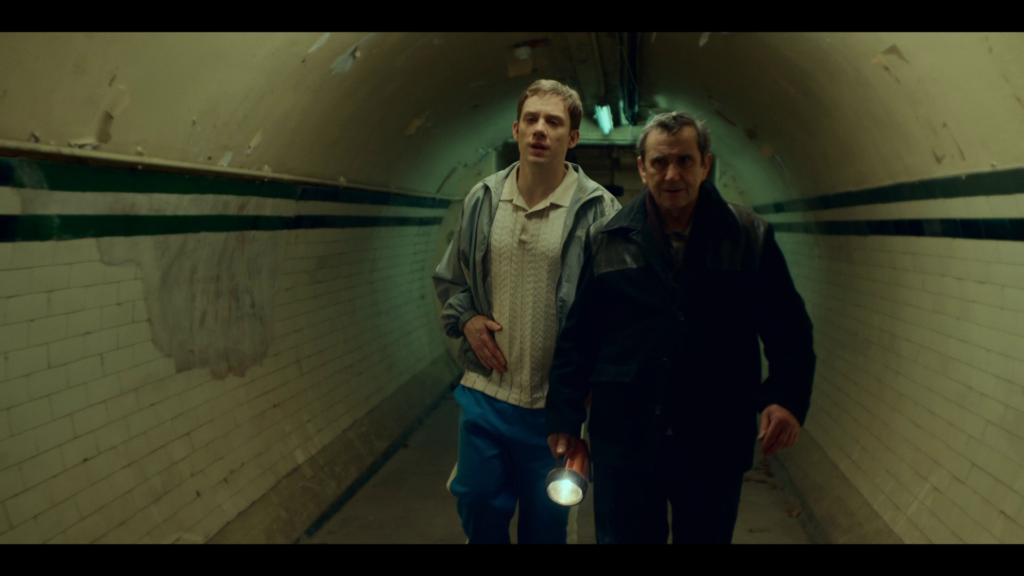
Down in the sewers, Sean has to rest for a moment, the pain from his gunshot wound too much to bear. Ronnie offers him some advice: “When you do get to Ireland, just stay there. Your father made it look easy, with all the charm and patter. But to do what he did, you have to be a right proper cunt, too.”
“You think I can’t be a right proper cunt?” Sean fires back.
“I know what my gut’s telling me.”
The episode’s action converges at the Greenwich pier. Still doggedly pursued by Luan, Sean staggers into the daylight, the helicopter in sight, with only five minutes left until it’s obligated to take off. Elliot intercepts him, and holds him at gunpoint; he’ll let Sean get on the helicopter, if he first tells Elliot where to find the driver hired to kill his family.
As it turns out, Elliot doesn’t have to look very far to find him; the standoff is interrupted by that very driver when he crashes his car into Elliot, climbs out, and stomps on his head. The anonymous, balaclava’d hitman bundles Sean into the boot, fending off Luan, Saba and Billy simultaneously for long enough to make his escape. The out-of-nowhere, hit-and-run kidnapping makes a thrilling capstone to a pretty faultlessly thrilling 43 minutes of TV.
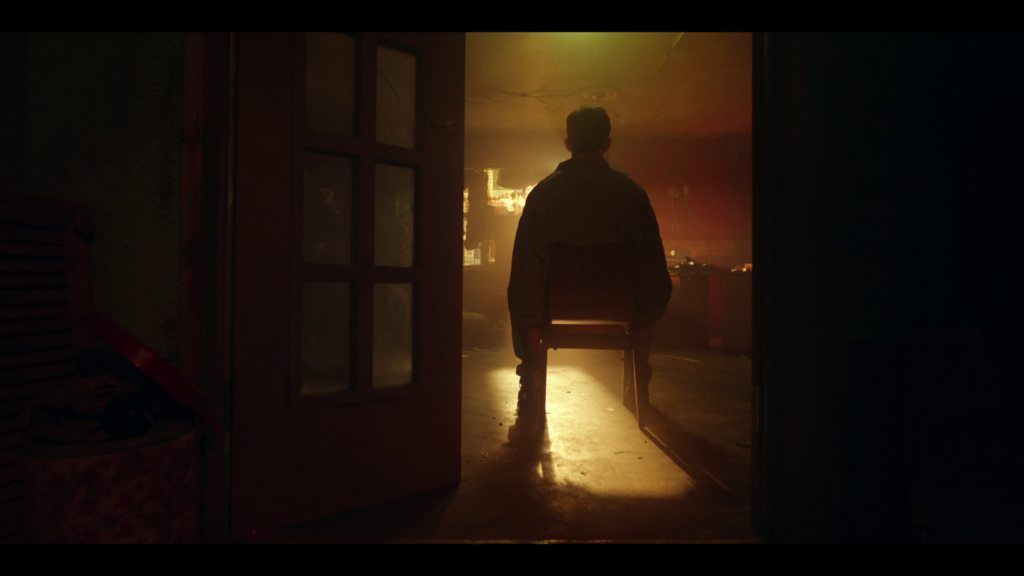
And then, the episode has 3 minutes remaining. I told you we’d get there.
While an ambulance carries Elliot off to hospital, Sean wakes up to find himself zip-tied to a chair in a condemned flat; he’s illuminated by horizontal shafts of pale sunset, peering through the gaps in the papered-over windows. His captor, still wearing his mask, sneers at him. “The great Sean Wallace,” he says, voice hoarse. “I thought it’d be difficult getting you here. Piece of piss. You’re not so special, are you?”
The masked man checks the text history on his smartphone. The most recent message, from an anonymous sender, simply says “DO IT.”
Sean offers him money. £5 million. £10 million. He offers him anything he wants. When promises fail to sway his captor, he resorts to bald-faced defiance. “I’m a Wallace,” he says, as though after everything he’s been through, he somehow still believes his parentage has the power to warp reality in his favour. “I’m Sean fucking Wallace. I’m the proper FUCKING CUNT–!”
The masked man loudly disagrees, by emptying an Uzi clip into Sean where he sits, the compounded impact of the bullets enough to tip over the chair. Sean lies on the floor, his lifeblood pooling about him, and he emits a faint gurgle from his flooding throat. The masked man shoots him a few more times, just to be certain.
To reiterate, in case you think you might have misread that last part: two episodes into this new season, Sean Wallace is dead, again. Permanently, this time. The scion of the Wallace dynasty, the one who set all this chaos in motion when he declared war on the Investors, and originally the protagonist of the show, is gone for good. His end is abrupt and ignominious; perfunctorily shot to death in a random, dilapidated building, by a new character with whom the audience has no prior relationship and whose motives are inscrutable. His final words are a barely-coherent string of screamed expletives. He failed, in the end, to emerge from his father’s shadow. He was not, in the final reckoning, the Proper Fucking Cunt.
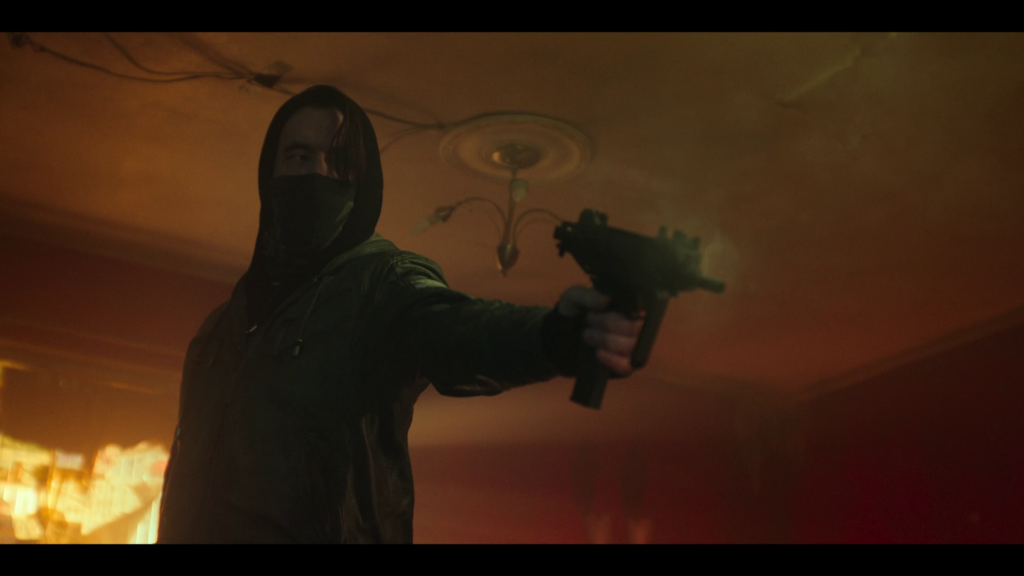
I can’t really bring myself to be mad about this. To be honest, after the initial “wait, they’re really doing it??” shock of the moment, my primary emotional response was schadenfreude. I’ve made no secret of the fact that I don’t find Sean Wallace an appealing character. His first shocking death at Elliot’s hand in S1 E9 was a beautifully executed narrative switcheroo, one that seemed at the time like it would move the story in new directions, in the company of characters who I better liked spending time with. His Father McGrath-esque resurrection in Season 2 was a regressive, dunderheaded writing choice, and in a weird way, killing him off so soon and so brusquely in Season 3 feels like Gangs of London’s universe ontologically correcting itself.
Still, having said that… what an odd, misshapen, and ultimately unsatisfying character journey Sean Wallace had, when all is said and done. The end he got in S1 E9 was the most dramatically fulfilling he was ever likely to reach; for its vulgar, tragic irony, that he’d finally asserted his own identity distinct from his father, only to immediately get killed for his trouble. It wasn’t a perfect character arc by any means, but it did at least feel like a closed loop.
..what an odd, misshapen, and ultimately unsatisfying character journey Sean Wallace had, when all is said and done.
And then he spent 9 months in a prison cell; got released; caused a bunch of borderline-arbitrary mayhem; got arrested; spent a further 9 months in a different prison cell; broke out, and was promptly murdered for obscure reasons only tangentially related to anything he’d been doing up to that point. Classic story structure. Tale as old as time.
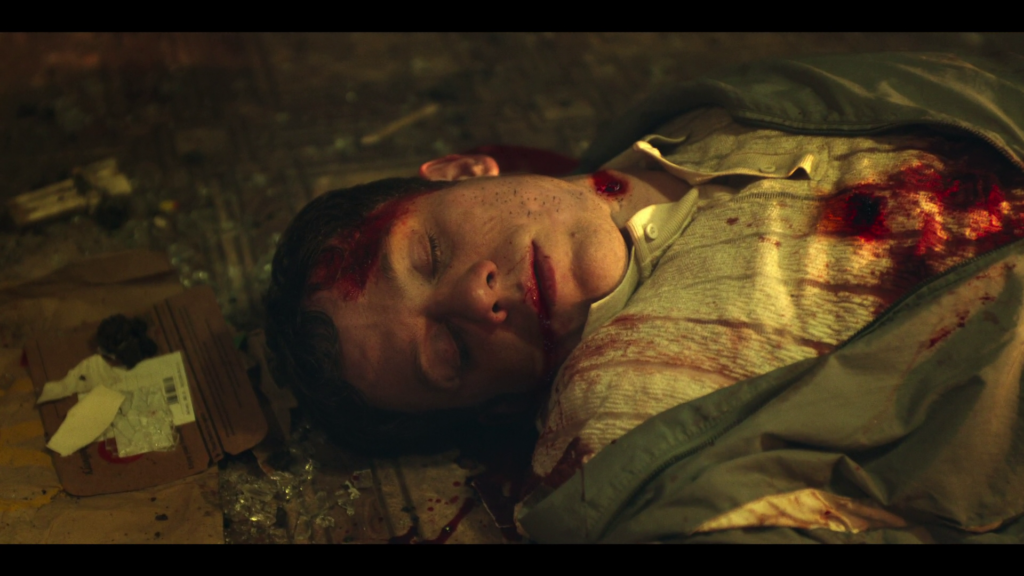
Lead writer Peter McKenna gave an interview to GQ Magazine recently where he talks in detail about this twist, and the decisions that led to it. Most of McKenna’s reasoning comes back to the same old chestnut: that the show needs to feel dangerous and high-stakes, that it keeps the audience on their toes when anyone can die at any moment, etc. etc.
Which, OK, sure, I guess so. But that line of thinking disregards what motivates an audience to watch a show from week to week and year to year in the first place. It’s because there are characters we get invested in seeing grow and change and interact. When a character dies, we can tell when it’s a death that dignifies the time we spent with them with meaning, as opposed to when it’s merely a tactic to “raise the stakes.” Sean Wallace is a great case study, now that he’s done both.
An interesting detail from that GQ interview is that McKenna says the decision to kill Sean off was reached early in the writers’ room drafting process, and the agreement between the creative staff was unanimous. If the decision was as easy as McKenna makes it sound, it suggests to me that Pulse Films were as tired of this asshole hanging around as I was. Better to get him out of the way and refocus attention on Season 3’s new mysteries and intrigues.
- Review Series: Gareth Evans
- Review Series: Gangs of London
Is It Good?
Good (5/8)
More Gangs of London reviews
Andrew is a 2012 graduate of the University of Dundee, with an MA in English and Politics. He spent a lot of time at Uni watching decadently nerdy movies with his pals, and decided that would be his identity moving forward. He awards an extra point on The Goods ranking scale to any film featuring robots or martial arts. He also dabbles in writing fiction, which is assuredly lousy with robots and martial arts.

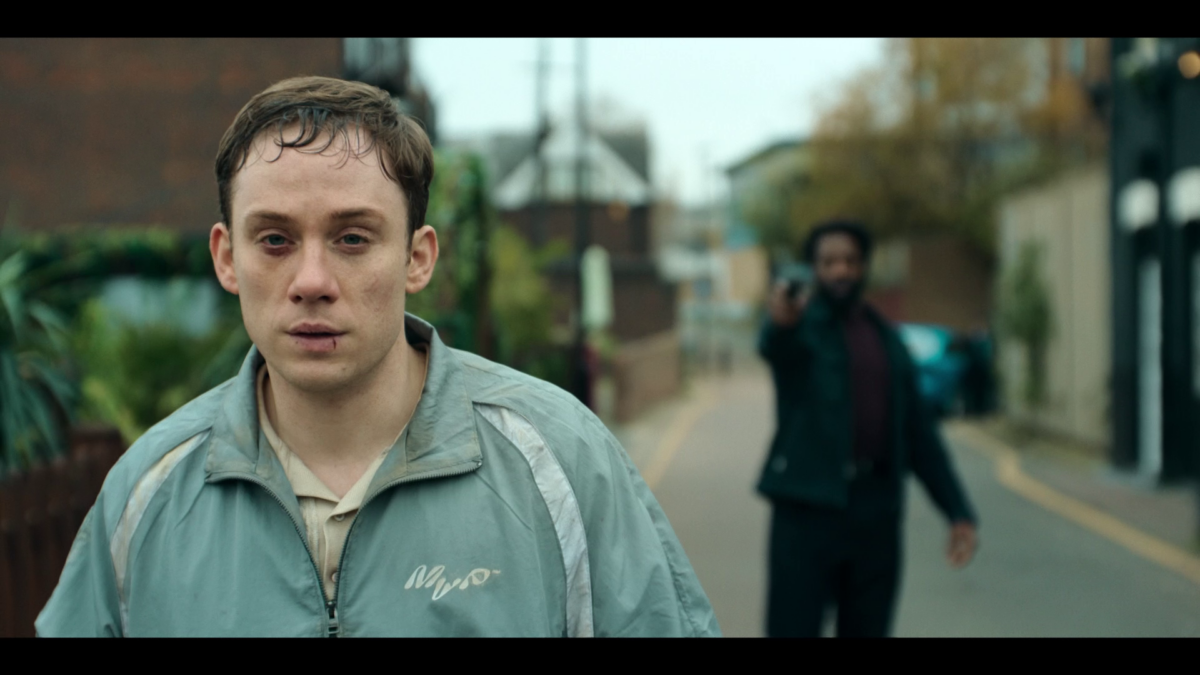
3 replies on “Gangs of London, Season 3, Episode 2”
There is no way to watch season 3 in the US!!! So pissed!!
You’re not alone 😭
I know your pain well. It sucks being made to wait for a show’s international rollout, especially when you don’t know how long you have to wait.
Hopefully AMC+ pulls their finger out soon!